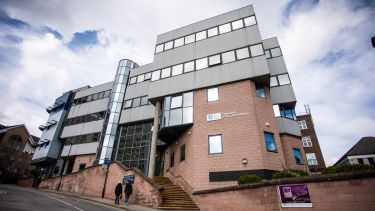Implantology courses
The University of Sheffield has been at the forefront of dental implantology and implant-based research for over 30 years. Our strong legacy in implantology is founded on the work of Emeritus Professor Ian Brook, who pioneered our UK-renowned 'one-to-one' course in partnership with Nobel Biocare.

The University of Sheffield continues to deliver world-leading research in implantology and implant-related biomaterials science.
Two-day foundation course
Location
Ringwood Hall Hotel, Chesterfield
Upcoming course dates
March 8 - 9 2024
October 11 - 12 2024
About the course
This weekend foundation course offers an ideal opportunity to start your learning journey in implantology. The course assumes no postgraduate knowledge of implantology, although it also provides an introduction to the Replace Tapered and Active implant systems for more seasoned practitioners looking to gain familiarity with Nobel Biocare implants.
The course runs biannually and is a primer for delegates enrolling on the University of Sheffield's 'one-to-one' program.
Information
Download the course programme for GDPs
Download the parallel nurse programme
Find more information about the Ringwood Hall Hotel
One-to-one course
Location
School of Clinical Dentistry, University of Sheffield
About the course
This is an 18-month comprehensive program in the treatment planning, placement and restoration of implants using the Nobel Active and NobelReplace Tapered systems.
- Module 1: Treatment Planning and Implant Theory
-
(7 days, including introductory lecture day)
In this module, delegates will attend 6 Multidisciplinary Team (MDT) implantology clinics and gain over 20 hours of direct clinical experience in assessing patients referred for implants under the dual supervision of both Restorative and Surgical Specialists. The MDT clinic gives delegates the opportunity to hone assessment, diagnostic and planning skills for both straight-forward implantology cases as well as offering exposure to complex case planning undertaken by Restorative and Surgical experts-in-the-field. The structure of the clinic allows candidates to gain an appreciation of both the surgical and restorative challenges that face a dentist undertaking implant care, and provides an approach that promotes joined-up thinking when progressing to independent practice.
On each clinical day, delegates will attend one MDT assessment clinic and also attend one clinical skills laboratory session in order to fully prepare for the subsequent surgery and restorative modules. Clinical skills sessions are a blend of lectures and practical skills work, with a heavy emphasis on hands-on training. Sessions will cover:
- NobelReplace Tapered system; theory and placement
- Nobel Active system; theory and placement
- Open and closed tray impression techniques
- Overdentures: theory, placement and impression techniques
- Immediate implant placement post-extraction
- Cone Beam CT interpretation and case planning
- Guided Bone Regeneration techniques
- Soft tissue techniques
- Peri-implantitis and managing problems
In addition to the 6 clinical days, the module commences with a full day of introductory lectures, covering:
- Planning
- Assessment of aesthetic risk
- Preoperative written information; what and how
- Consent
- Introduction to the MDT clinic
- Setting up in general dental practice
- Module 2: Surgery
-
(6 days full clinical)
In this module, delegates attend the School of Clinical Dentistry’s dedicated implant suite for full-day sessions of implant surgery. Delegates are paired for each full day session, and either rotate between performing and assisting each other whilst under the guidance of a Surgical Specialist, or for cases requiring bilateral surgery each candidate undertakes unilateral implant placement. Delegates can expect to gain a minimum of 35 hours’ experience of implant surgery.
In addition to undertaking multiple implant placements over the course of the module, delegates may also gain exposure to pre-prosthetic surgery, guided bone regeneration techniques, soft tissue surgery and the surgical management of failing implants. All candidates will gain experience of direct implant placement and guided bone regeneration surgery over the course of the module; case-mix cannot be fully guaranteed and therefore exposure to more exotic techniques will vary, although the module provides candidates with an experience that often extends into areas of advanced implantology. We hope this will ignite our delegates’ interests in progressing towards further competencies in more complex implant treatment, through further postgraduate training with ourselves and further afield.
- Module 3: Restorative
-
(5 full days clinical and theory)
Delegates will be fed into an NHS-based restorative program, and will gain hands-on experience of restoring implants over 6 full-day clinical sessions. These sessions have a large emphasis on the hands-on restoration of implants, although also deliver final consolidating knowledge on preoperative assessment. The clinical case-mix that delegates will restore is reflective of those situations common to everyday practice, with an emphasis placed on user-friendly, efficient restorative techniques to ensure predictable outcomes.
Teaching team
Course director: Dr Robert Bolt
Surgical lead: Dr Simon Atkins
Grafting: Mr Abdurahman El-Awa
Course tutors
- Dr Issam Bakri
- Miss Elena Kyriakidou
- Miss S Nolan
Nursing team
- Ms G Temprell
- Ms L Mills
- Ms Warren
- Mrs L Bradley
- Mrs G Stonehouse
Research team
Research facilities
The School of Clinical Dentistry provides a high quality research environment with well-equipped, state-of-the-art research facilities that have been continuously improved to accommodate our increasing activity. The School has a research wing incorporating over 660m2 of research laboratories for research staff and postgraduate students.
The laboratories include resources for materials science, cell culture (including a fully-staffed Tissue Culture & Tissue Engineering facility), cell and molecular biology, and advanced microscopy. Please explore our facilities below and get in touch if you would like to collaborate or investigate commercial facing projects- such as testing facilities.
Contact us
For more information, please contact Dr Robert Bolt
